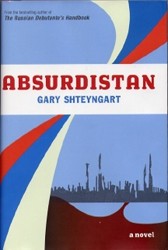Gary Shteyngart’s novel, The Russian Debutante’s Handbook, follows in the tradition of novels such as Henry Roth’s masterpiece, Call It Sleep. Each is masterfully written, integrating believable historic elements with fictionalized stories that give insight into the adaptations of an immigrant community to life in America. Shteyngart’s work is long overdue. The collapse of the Iron Curtain brought a massive Russian immigration to America, thirsting to benefit from the freedoms offered here both educationally and financially. The impact of this sizable community on life in New York is worthy of documentation and romanticisation. We track the evolution of Vladimir Girshkin from humdrum clerk in an immigrant absorption center on New York’s Lower East Side, to zany con man back with the ex-patriot community in Prava. As East and West intersect, characters appear and reappear, some humorous, some humdrum and some mafiosa quality, wandering through the pages of the novel and through the ever evolving life of our variably humorous and melancholy hero. Through his work at the absorption center, Vladimir encounters an eccentric Russian war hero whose best friend is an electric fan. This event literally blows Vladimir off his boring life course and his mechanical sexual relationship with his girlfriend Challah into the adventurous life of a pyramid scheme promoter whose scheme is, as are the rest of Vladimir’s encounters, brilliant, crazy and maturing. — 2002/2003 Judges for National Jewish Book Award in Fiction

The Russian Debutante’s Handbook
Discussion Questions
From Penguin Random House
1. Assimilation is a major theme in The Russian Debutante’s Handbook. Discuss Vladimir’s various attempts to assimilate. Which one is most successful and why?
2. Vladimir retains a distinct self-identification as a poor Russian Jew, despite his mother’s success in America and the many opportunities available to him as an American citizen. Discuss his ennui as a manifestation of successful Americanization.
3. Rybakov is also attempting to assimilate in his way. Discuss the humor inherant in the Fan Man’s chief impetus toward citizenship being the legitimization of his opinions.
4. How does Vladimir’s mother’s intense desire for her son’s success backfire? Why does her pressure on him to assimilate also backfire?
5. Vladimir doesn’t seem to care much about money in his days at the Emma Lazarus Society. How does his affair with Frannie change that? What is the newfound appeal of material success?
6. Vladimir shows himself to be remarkably adaptable. What is the crucial difference between adaptation and assimilation?
7. History is an important character in this novel. How does it differently effect the lives of Rybakov? Kostya? Perry Cohen?
8. How is the destruction of the Foot symbolic of both Prava’s escape from history and Vladimir’s?9. What does Vladimir learn about appearances from Morgan? Discuss the irony of this All-American girl’s desire to immerse herself in Prava and its politics, and flee the bland , affluent normalcy so many immigrants seek.
10. Do you believe that Vladimir has assimilated at the end – that his life in Cleveland as an accountant with a wife and baby on the way has finally Americanized him? Or does Vladimir’s nostalgia for his past status as an outcast reveal something more complex about the makeup of our souls?

Help support the Jewish Book Council.



